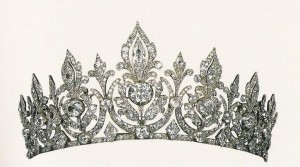This is another except from my 90 day devotional book: Hebrew Word Study Revealing the Heart of God. In four years of publishing daily Word Studies/Devotionals on our website this has been the most popular posting. If you enjoy it I hope you will purchase our book on Amazon as a Christmas present for a friend or relative. It is now being offered at 29% discount by Amazon.

WORD STUDY – THE QUEEN IN GOD’S PALM מלכח נכף אלהיך
Isaiah 62:3: “You will also be a crown of beauty in the hand of the Lord and a royal diadem in the hand of the your God.”
In ancient Hebrew culture there were two types of crowns. There was an enduring crown and a temporary crown. The permanent or enduring crowns were worn by royalty and priests, the temporary crowns were worn by brides and grooms. The crowns worn by brides and grooms were temporary because they were made of flowers or leafy branches which would quickly wilt. The crown mentioned here is an ‘aretet which is one which entirely circles the head. It is a crown of pa’ar which means beauty, glory and/or honor. It also means green bough or branch. Thus, this is the temporary crown worn by a bride or groom.
This is in the hand (yad) of Jehovah. The yad or hand is a symbol of power and protection. In relationship to a bride, it would symbolize protection. Thus the prophet is saying that God will protect us as a husband would protect his bride. It is interesting to note that a groom also wears such a crown. In light of previous studies we could infer that we are not only a bride to God but a husband as well. Where God will protect us as a husband would protect his bride, the role is also reversed where we as a husband would protect God as our bride, ie., as a husband would protect his bride’s heart we would protect the heart of God.
The verse continues to say we will be a royal diadem in the hand of our God. The word diadem is snafu which is usually rendered as a turban because it means to wrap around. But this is a royal turban. The word translated for royal is really melechah which is often rendered as a queen. A queen did not wear a turban so it is generally translated as royal. Yet why does the Hebrew use a word which literally means a queen? Note how the verse says in the hand of your God. We are a crown to Jehovah and a diadem to Elohim. As I noted in an earlier devotional, to the Hebrews Jehovah represents mercy and Elohim represents judgment. The word in Hebrew used for here is kap which is the palm of the hand. Here again we have the picture of God who gives both protection and judgment.
Protection we understand, but judgment has such a harsh sound. This judgment is administered in the palm of God’s hand. Michelle Obama created quite a snafu recently when she placed her hand on the back of Queen Elizabeth. The shock waves were heard around the world. The President’s wife touched the queen. Somebody in Obama’s protocol department will loose their job over that one. A very basic principal known to everyone except Americans, who have no concept of royalty, is that one is never to touch a queen except on rare occasions one may touch her hand, if offered. The only one who can touch a queen is someone who shares a deep intimacy with the queen. Here in Isaiah 62:3 we find a picture of a queen in the palm of God’s hand. Whatever the judgment, it is offered in deep intimacy with God.
I look at it this way, we are protected by God as a husband would protect his bride. If we do face some form of judgment, it will only be done safely in the palm of God. So if God brings His judgment say upon our nation, we will be a part of that judgment simply because of our geographical location. Yet we need never fear for we will be His queen resting safely in the palm of His hand.








Recent Comments